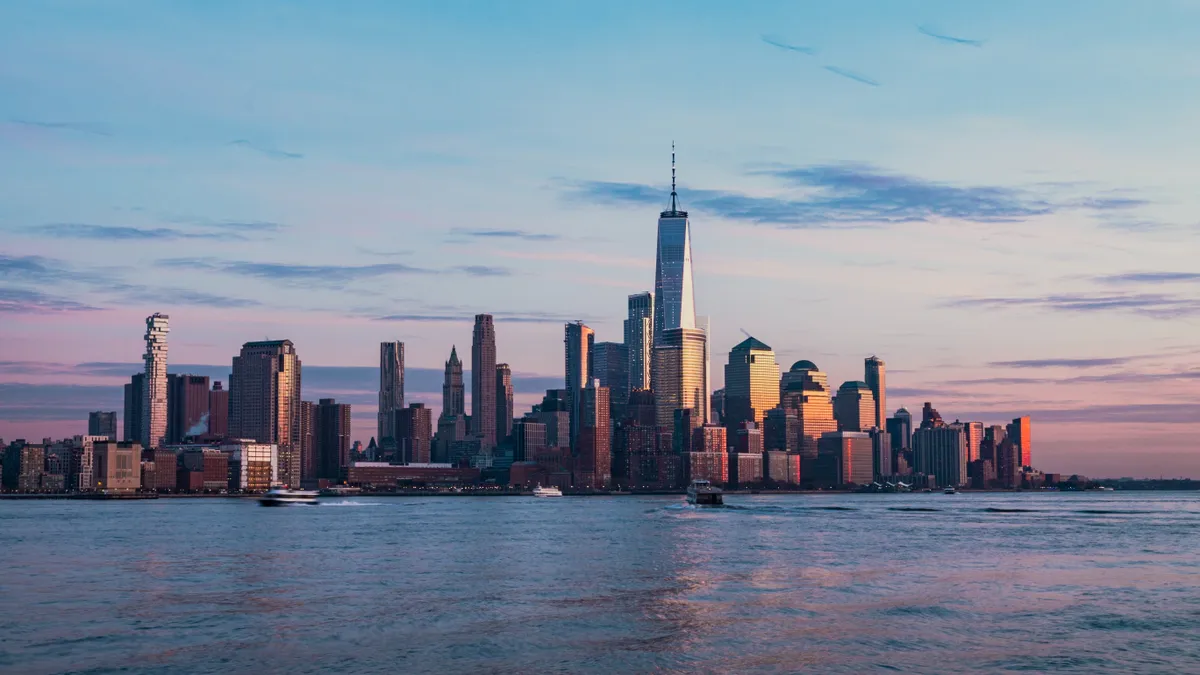NEW YORK — Comptroller of the Currency Joseph Otting and Operation HOPE founder John Hope Bryant make an unlikely duo. Otting is more conservative, white and born in an Iowa town of 6,000; Bryant is more liberal, black and a product of Compton. Yet, formative experiences, either witnessing poverty or growing up alongside it, forged a common desire: to turn disadvantage into opportunity.
Bryant accompanied Otting this summer on a tour of low-income areas in five cities to evaluate the potential impact of updates to the Community Reinvestment Act, a 1977 law meant to encourage banks to meet poorer residents’ financial needs and to curb discriminatory credit practices.
Otting intends by the end of the year to issue a notice of proposed rulemaking outlining changes to the CRA, he said Wednesday at an annual conference hosted by The Clearing House and the Bank Policy Institute. That would be followed by a 60-day public comment period and a final rule around April, he said. The law was last revised in 1995, and Otting had targeted it long before now.
"I would have bet my last dollar you wouldn’t come to D.C. and make CRA your linchpin,” Bryant told Otting — and an audience — Wednesday. “There’s no reason [I’d believe you’d] lean into my neighborhood. This whole time, you’ve been scheming on how to do good."
Banker in a blue suit
Bryant knows a thing or two about being a positive force for change. He founded Operation HOPE in response to the 1992 Los Angeles riots, and the organization has steered more than $2.7 billion in economic activity to ensure a secure financial future for the disenfranchised. He has also served on the President’s Council on Financial Literacy.
But he traces his financial journey to when a banker in a blue suit visited his elementary school to explain his career to a then-10-year-old Bryant’s class.
"I asked him, 'What do you do for a living and how can I make money legally?'" Bryant said.
The banker replied that he supported entrepreneurs. Bryant said he looked up the word "entrepreneur" in a dictionary that day, and not long after, he started a neighborhood candy store.
More recently, Bryant has been the banker in a blue suit. On a visit to a school in Detroit, Bryant said he asked three students in a class what they would do if they were each given $70 for Nike. Two said they’d put the money toward Air Jordan sneakers. A third, Derrick, said he’d buy Nike stock. As the other two students began pressuring Derrick to change his mind, Bryant said Derrick told him, "I want them to buy Air Jordans because they’d be making me money."
"Poverty is a mindset," Bryant said.
No more 'no' business
In updating the CRA, Otting said he’s "taking banks out of the 'no' business" by supporting the underserved. Among the efforts Otting is looking to include in the revised CRA is a doubling, to $2 million, of the upper limit of a CRA-qualifying small-business loan. Otting said he was "very optimistic" that the Federal Deposit Insurance Corp. would issue the notice of proposed rulemaking alongside his agency but was less confident that the Federal Reserve would also weigh in.
To be sure, the Office of the Comptroller of the Currency (OCC) may have to say 'no' to some things allowed under the current CRA. Otting said this summer he was considering giving banks CRA credit for investing in Opportunity Zones and disallowing CRA credit for offering loans to the highest earners in lower-income neighborhoods. Opportunity Zones have at least twice the national average of poverty and unemployment rates, the Economic Innovation Group, a Washington think tank, told American Banker. Minority groups make up more than half their population.
Banks such as JPMorgan Chase, Regions and SunTrust have worked to establish a footprint in low-income urban areas, Bryant said. "You don’t do 200 locations as a community service," he said. "That’s part of a business plan."
Otting said the needs of people in those areas have changed over the years. "Five or seven years ago, on tours of low-income areas, the first thing you’d hear was, 'We need jobs.' The second was, 'We need funding for small businesses.' And the third was, 'We need housing,'" he said. "Now the first thing is, 'We need housing.' The second is, 'We need housing.' Third, 'housing.'"
The underserved aren’t only confined to cities, however. Otting said he remembers going to a Native American-majority area in South Dakota where his dad got along well with tribal representatives and "seeing the impoverished element."
"As we’ve consolidated banks, we’ve pulled away from rural America [and] Indian Country," Otting said.
Bryant said Otting made an early impression that convinced him of how much the comptroller believed in helping all people be banked. "In your office is a picture of female leaders of all races from the OCC," in addition to a copy of the charter for the Freedman’s Savings Bank, a post-Civil War financial institution aimed at encouraging economic development among newly emancipated black people, Bryant said.
That sort of statement on inclusion could be easy to write off if Otting were more liberal, Bryant said. "But it’s important that you, a conservative, did that."






















